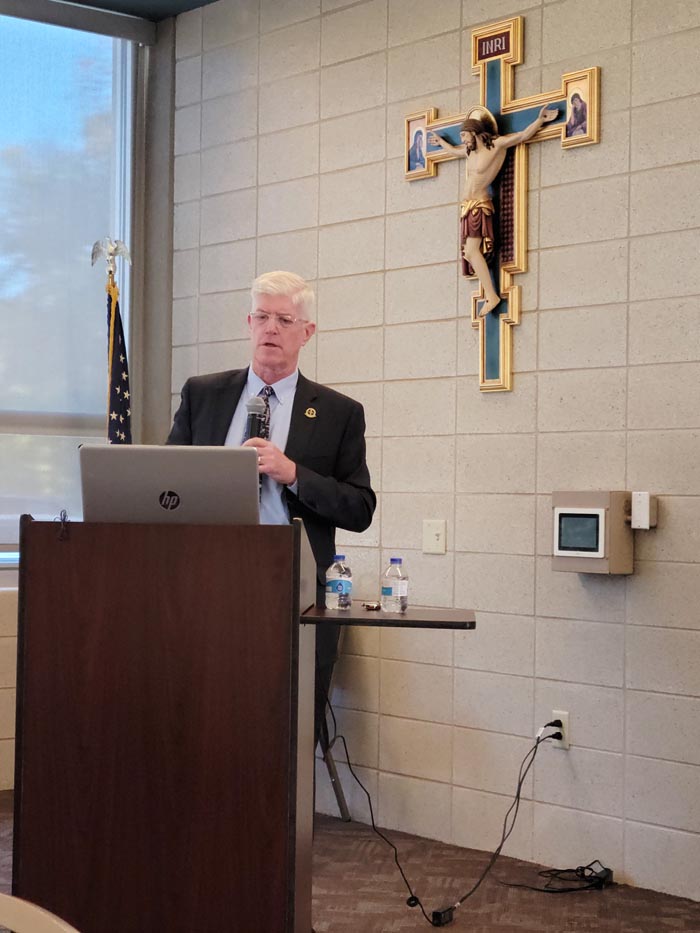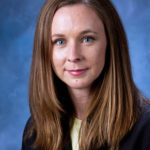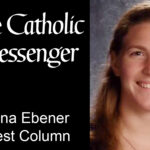
Dr. Jack Lane speaks at St. Pius X Catholic Church in Rock Island, Ill., Oct. 15.
By Anne Marie Amacher
The Catholic Messenger
Dr. Jack Lane, who gave a presentation at the Vatican Sept. 15 on recovering the Christian foundations of modern medicine, shared his insights with Catholic healthcare providers in the Quad-City area Oct. 15. Lane, a professor of radiology at the Mayo Clinic in Rochester, Minnesota, is vice president of the World Federation of Catholic Physicians.
His talk to the St. Thomas Aquinas Guild of the Quad Cities focused on “The Christian Health Care Professional in the Era of Secular Medical Ethics.” A White Mass at St. Pius X Catholic Church in Rock Island, Illinois, preceded his presentation.
He noted that the Mayo Clinic teaches its employees about the history of the hospital, which began as St. Marys Hospital, founded by Franciscan sisters in 1889. He took his audience on a journey through Western Civilization and the effect of eras, society and religion on healthcare. While the arts teach people what they can do, “Theology teaches us what we ought to do.”
Over time, a materialistic worldview grew. “We isolated ourselves from the Creator. Religion was replaced by science.” Europe abandoned religion in the 17th and 18th centuries, focusing on progress in science, Lane said. By the 19th century, the post-Enlightenment period, religion was at battle with science.
Eugenics, “the practice or advocacy of improving the human species by selectively mating people with specific desirable hereditary traits” (www.history.com), advanced in the 19th and 20th centuries. However, following World War II, “the West hit the reset button as people realized and were shocked about the ‘cleansing’ of various people,” Lane said.
“The sexual revolution was the next challenge,” he continued, with the introduction of the birth control pill. The Hippocratic Oath also faced challenges. The National Library of Medicine states, “In medicine, the Hippocratic Oath for physicians was written specifically to prevent self-interested doctors from harming individual patients in ancient times. To better serve the present day needs and current ethics of physicians, a more inclusive pledge was written and adopted in October 2017” (https://www.ncbi.nlm.nih.gov/pmc/articles/PMC6166910/).
The overturn of Roe v. Wade will intensify the fight over the issue of abortion, Lane said. He referenced the country of Iceland, where few babies with Down syndrome are born because their mothers opt for abortion. In Canada, he said, physicians must provide referrals for persons who request assisted suicide. In Ireland, abortion is legal and publicly funded hospitals are required to provide that service.
What is next? Lane asked. “Do we (medical professionals) need to go off the grid?” How can medical professionals keep working and follow their conscience with laws being passed that say otherwise?
“Patients are a gift to us and we are a gift to our patients. Catholic healthcare is in trouble.” What can be done? He encouraged his audience to attend Mass and receive the Eucharist and to help the Catholic Medical Association and its guilds to be a voice for life.
“How do we build and move forward? We need to rediscover and focus on the image and likeness of God. We need to convert hearts one at a time and help rebuild medicine. … We need to work together to bring our faith and hope back into medicine.”
Prior to Lane’s talk, Bishop Louis Tylka, who leads the Diocese of Peoria, Illinois, celebrated the White Mass in St. Pius X Church. He noted the importance and necessity of celebrating a White Mass, to bring together health care professionals.
In his homily, Bishop Tylka observed that St. Teresa of Avila (1552-1582) worked to reform her religious community to live more faithfully as the order intended. She met resistance and formed her own religious community. Like St. Teresa, Catholic health care workers “need to be witnesses to what God calls us to do.”











